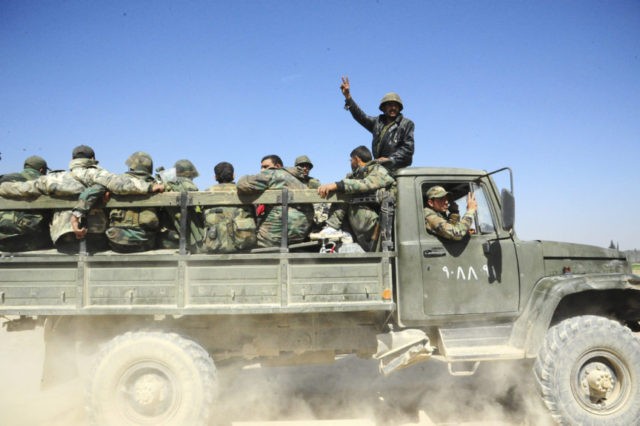An estimated 1,700 Syrian Arabs have abandoned the frontlines against the Islamic State (ISIS/ISIL) to assist the Kurds in their fight against Turkey in northern Syria as Ankara claims to have seized “nearly half” of the Afrin region.
“We have taken out around 1,700 fighters … to defend Afrin against terrorism,” declared Abu Omar al-Edilbi, a spokesman for the Arab militias, which have been fighting ISIS in eastern Syria as part of the U.S.-backed Syrian Democratic Forces (SDF), reports Reuters.
“We are (originally) from Aleppo and Idlib,” he added. “We had to because our families were homeless and displaced to Afrin more than three years ago. … We had to [redeploy fighters] unfortunately, and we informed our leadership that we must pull our forces.”
“After announcing the redeployment, he told Reuters in Raqqa that 700 of the fighters had already gone to Afrin in northwest Syria. They were moving from frontlines further east, where the Kurdish-led SDF seized vast territory from Islamic State militants last year with the help of U.S. jets and special forces,” notes Reuters.
U.S. Secretary of Defense Jim Mattis and other American officials have acknowledged that the fight between the Kurds and Turkey in northern Syrian has negatively impacted the international offensive against ISIS.
On Monday, U.S. Col. Robert Manning, a Pentagon spokesman, said that Turkey’s operation against U.S.-backed forces in Syria had distracted from the anti-ISIS offensive and led to an “operational pause” in the east.
Some ground operations carried out by the U.S.-backed SDF have temporarily stopped, indicated the colonel.
Although ISIS has nearly lost all of its territory in Iraq and Syria, the jihadi group remains a threat with the capability to regroup if left alone.
Acknowledging that there were about 10,000 anti-Turkey fighters in the Afrin region when the fight began, Nouri Mahmoud, a spokesman for the Kurdish fighters, reportedly said, “The numbers in Afrin are not a problem. The problem is the aircraft bombing the villages.”
On January 20, Turkey launched an offensive to push the U.S.-allied People’s Protection Units (YPG) out of territory along its border with northern Syria. YPG fighters make up the armed wing of the Kurdish Democratic Union Party (PYD) that controls swathes of northern Syria,
Turkey has long accused the YPG of being affiliated with the Kurdistan Workers Party (PKK), which both Washington and Ankara have officially designated a terrorist organization.
YPG fighters lead and make up the majority of the U.S.-backed SDF, a Kurdish-Arab alliance.
Nevertheless, the U.S. has refused to assist the Syrian Kurds in their fight against NATO ally Turkey, only urging Ankara to stop its offensive.
The Kurds have urged Arabs, including troops from the Assad regime, to help them protect Syria from Turkey.
Some troops loyal to Syrian dictator Bashar al-Assad have reportedly answered the call.
However, Turkish state media outlets claim that Ankara has still managed to conquer almost half of the Kurdish-controlled Afrin region.
Referring to the Turkish offensive against the Kurds, Deputy Prime Minister Bekir Bozdag said on Monday, “In Operation Olive Branch, so far 112 villages, 30 critical positions, and a total of 142 spots have been taken under control,” notes the state-run Anadolu news outlet.
A spokesman for the Turkish government later explained, “702 of 1,920 square kilometers (271 of 741 square miles) had so far been taken under control in Syria’s Afrin region,” adding that 2,795 so-called terrorists, including Kurdish fighters, have been “neutralized” since the start of the operation in January.
Despite Turkey’s concerns that the YPG is an extension of the terrorist PKK group, the U.S. has continued to lend support to the Kurds, angering Ankara.
Turkey has rejected U.S.-backed calls to implement a truce, including a United Nations Security Council resolution demanding a 30-day ceasefire across Syria.

COMMENTS
Please let us know if you're having issues with commenting.